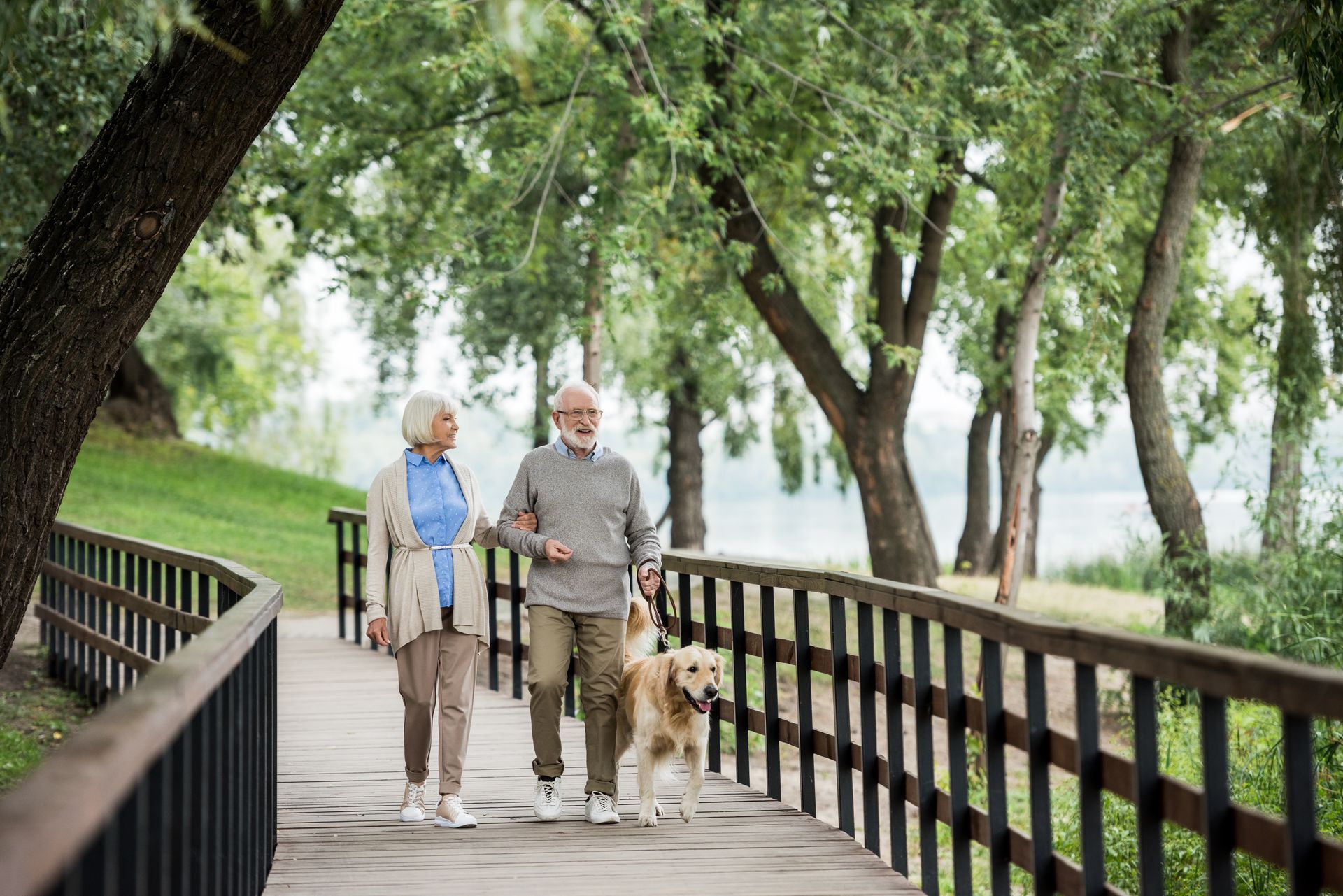Home Health Services Serving Hampden County & Western Massachusetts
Call (413) 217-9861
Rejuvenate Your Golden Years: The Remarkable Benefits of Walking for Older Adults
As the golden chapters of our lives unfold, cherishing and nurturing our well-being takes center stage. While various factors contribute to healthy aging, physical activity is undoubtedly a cornerstone. Among the many types of exercise available, walking stands out as an easy and accessible option for older adults. In addition to being low-impact and low-risk, it offers remarkable benefits that can enhance both physical and mental well-being.
According to a study on the American Heath Association, adults who took around 4,500 steps per day had a 77% lower observed risk of a cardiovascular event [1]. For older adults, walking provides both physical and mental health benefits, including improving cardiovascular health, reducing the risk of chronic diseases, and enhancing cognitive function.
Article Topics
- Health benefits of walking for seniors
- Getting started with walking
- Mental Benefits of walking with a companion
Health Benefits of Walking for Seniors

Walking, a simple and basic movement, packs a lot of health benefits, especially for seniors. It's a gentle, low-impact exercise that's easy, free and suitable for people of all ages and most abilities. More importantly, it's a great way to improve or maintain your overall health. Despite its simplicity, the benefits it provides are immense and remarkably beneficial for older adults. From enhancing heart health to boosting mental acuity, walking is a powerhouse of wellness for seniors. Let's delve into the numerous health benefits of this simple yet powerful activity.
10 Benefits of walking for older adults include:
- Improves Coordination and Balance:
Regular walking fine-tunes motor skills, helping seniors maintain a steady gait. This can significantly decrease the chances of falls, a common concern among the elderly. In fact, the CDC estimates that over 36 million falls are reported each year [2]. Walking can help reduce the chances of injury due to falls by improving overall balance and coordination. - Strengthens Bone Density:
Weight-bearing exercises like walking can combat the loss of bone density, reducing the risk of osteoporosis and fractures. This is especially important for women, who are more prone to bone loss as they age. - Enhances Cardiovascular Health:
Walking increases heart rate, strengthens the heart, and improves blood circulation, all of which are vital in warding off cardiovascular diseases. As mentioned earlier, The American Heart Association reported that older adults who took around 4,500 steps per day lowered their risk of experiencing a cardiovascular event by 77%! [1] - Boosts Mental Health and Cognitive Abilities:
Regular walks can elevate mood through the release of endorphins and can slow cognitive decline, helping to keep the mind sharp. - Promotes Social Interaction:
Group walks or walking clubs can foster social bonds, combatting feelings of isolation and loneliness that some older adults may experience. - Supports Joint Health:
By keeping them in motion, walking can help alleviate symptoms of arthritis and reduce joint stiffness. - Assists in Weight Management:
Walking burns calories and helps in achieving and maintaining a healthy weight, reducing the risk of obesity-related illnesses. - Aids Digestive Health:
Regular walking stimulates the digestive system, promoting regular bowel movements and overall gut health. - Improves Respiratory Function:
Walking can increase lung capacity and efficiency, ensuring better oxygenation of the body. This is especially beneficial for older adults with respiratory conditions such as COPD. - Enhances Sleep Quality:
Engaging in regular physical activity like walking can lead to better sleep patterns, allowing seniors to rest more soundly and wake up refreshed.
Getting Started with Walking

If you're an older adult looking to start walking, it's important to remember that every journey begins with a single step. Here are some tips to help you get started:
- Consult Your Doctor: Before starting any exercise routine, consult your doctor and discuss any health concerns you have.
- Invest in Proper Footwear: Make sure you have a comfortable pair of shoes with good arch support and cushioning to reduce the risk of injury.
- Start Slowly:
Begin with short walks and gradually increase the duration as your body gets used to it. Starting slow can also help prevent muscle soreness or injuries.
- Find a Walking Buddy: Having a walking companion can provide motivation, increase accountability, and make the experience more enjoyable.
- Be Mindful of Your Surroundings: Be aware of your surroundings and choose safe walking paths to avoid falls or accidents.
- Set Realistic Goals: Set achievable goals and track your progress to stay motivated. Start with a small daily step count and gradually work your way up to a comfortable daily step count.
- Stay Hydrated: Drink plenty of water before, during and after your walks to avoid dehydration.
Mental Benefits of Walking with a Companion
While walking alone can provide many mental health benefits, doing it with a companion has its own set of advantages. Here are some reasons why walking with a partner or in a group is beneficial for seniors:
- Increases Social Interaction: Walking with a companion or in a group provides an opportunity for social interaction, which can help reduce feelings of loneliness and isolation.
- Motivates You to Stay Active: Having someone to walk with can provide motivation and accountability, making it more likely for you to stick to your walking routine.
- Creates a Sense of Community: Walking in a group can foster a sense of community and belonging, which is especially important for seniors who may feel disconnected from society.
- Provides Safety and Comfort: Having someone to walk with can make you feel safer and more comfortable, especially if you are walking in unfamiliar areas.
- Makes the Experience More Enjoyable: Walking with someone else can make the experience more enjoyable by providing company, conversation, and shared experiences.
Walking is a simple yet powerful activity that offers numerous health benefits for older adults. From improving physical health to boosting mental acuity and promoting social interaction, regular walks can significantly enhance the overall well-being of seniors.
Searching for companion care near me? Chanda Care in Western MA provides compassionate in-home care for seniors, including companionship, walking with seniors, personal care, transportation and more. Contact us today to learn more about our services and how we can help you or your loved one live a fulfilling life in the comfort of their own home.
References:
[1] https://newsroom.heart.org/news/for-older-adults-every-500-additional-steps-taken-daily-associated-with-lower-heart-risk#:~:text=Nearly%2012%25%20of%20older%20adults,lower%20risk%20of%20cardiovascular%20disease.
[2] https://www.cdc.gov/injury/features/older-adult-falls/index.html#:~:text=About%2036%20million%20falls%20are,departments%20for%20a%20fall%20injury.
Services
Chanda Care Services offers a support system for families and caregivers of clients and provides home management care to clients who want to remain as independent in their home for as long as possible.
Our Services
Support & Information
All Rights Reserved | ChandaCare

